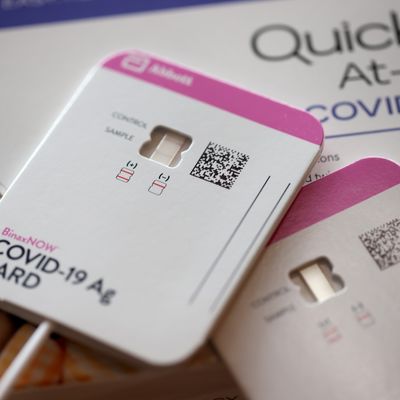
The Centers for Disease Control and Prevention on Monday updated its guidance on the use of at-home COVID tests, suggesting people use the self-tests before getting together indoors with members of other households and noting the tests can be used regardless of vaccination status or whether someone is experiencing symptoms.
As the U.S. heads into the thick of the holiday season, the CDC now recommends that “even if you don’t have symptoms and have not been exposed to an individual with COVID-19, using a self-test before gathering indoors with others can give you information about the risk of spreading the virus that causes COVID-19” — especially “before gathering with unvaccinated children, older individuals, those who are immunocompromised, or individuals at risk of severe disease.”
Previously, the CDC had recommended that at-home self-tests be used only when someone is symptomatic; the agency had offered less guidance on when test taking should be considered and included no mention of testing before gatherings.
The CDC says a positive self-test result means someone likely has a COVID-19 infection and should self-isolate for ten days and wear a mask around others. A negative result “means that the test did not detect the virus and you may not have an infection, but it does not rule out infection,” the agency adds. “Repeating the test within a few days, with at least 24 hours between tests, will increase the confidence that you are not infected.” The CDC also says Americans should follow the instructions provided by each individual test manufacturer — some of which say a second at-home test should be taken later to confirm a negative result.
At-home COVID tests, which are most commonly rapid-antigen tests, are now sold in most pharmacies and by major web retailers in the U.S., though demand has persistently outstripped supply in recent months across much of the country. Last week, the Biden administration announced that private health insurers will be required to reimburse Americans for the cost of at-home testing, though the program won’t come into effect until January 15 and reimbursements will not be retroactive for test purchases made before then. The reimbursement plan was one of several new pandemic measures Biden announced to help curb the anticipated spread of the worrisome new Omicron variant as well as a winter COVID wave from the still-dominant Delta variant.






























